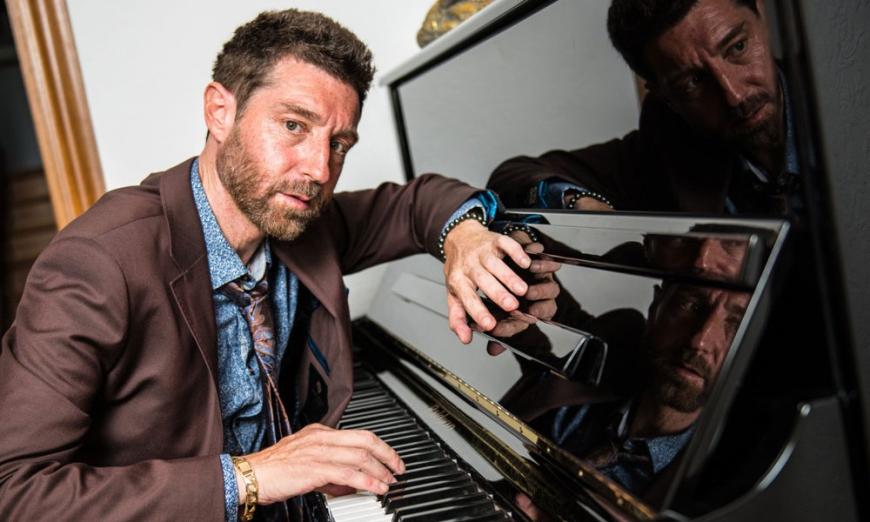
Facebook has unleashed all manner of forces in the world, many of them baleful and malevolent, but I’ll always be grateful for the opportunity provided by the site to stand over Benny Green’s shoulder as he writes his memoirs.
Over the past few years, the great Berkeley jazz pianist has regularly posted reflections on his musical journey, writing with the kind of honesty and emotional intelligence that is precious online or IRL. Offering an extended peek into the book on which he’s been laboring, Green has shared an array of sympathetic sketches of his colleagues. Whether he’s writing about contemporaries or older masters, the portraits are shaded by his abundant gratitude for the embrace he’s received from pioneering Black artists a generation or two older.
His tributes to the bandleaders who shaped him early on — vocalist Betty Carter, drummer Art Blakey, and bassist Ray Brown — are rendered with love and precision, but I’ve particularly enjoyed his passages on other pianists. From informal hangs, apprenticeships, and reverent nightclub encounters, he conjures an extended family of jazz practitioners wrestling with an instrument that demands constant devotion.
In portraying his adolescent and young adult self-consciousness, obliviousness, and insecurities, the 59-year-old Green shines a light on dynamics that jazz fans often wonder about from the outside but rarely hear about firsthand, like a description of his inner turmoil upon realizing that a coveted spot in the Jazz Messengers was a temporary trust, not a tenured position.
In one recent post, he described watching Memphis piano great James Williams shepherd his teenage protégé Geoffrey Keezer into a club to sit in with Blakey for what was essentially an on-the-job interview for Green’s Messengers gig. “I had a revisitation of the same feeling in the pit of my stomach that I’d had when Stephen [Scott] sat in with Betty [Carter],” Green wrote, “a bubble bursting of the false perception I’d formed of the band providing a safety blanket of family security for me. My delusion was giving way to a rude awakening that Art and Betty’s cause is something deeper than can ever be defined through any lone member who passes through their ranks.”
Green’s recent solo performance at Piedmont Piano Company, where he recorded a solo album the previous month, felt like a similarly candid, albeit musical, conversation. The Berkeley High grad long ago forged an ebulliently personal approach drawing from influences across the modern jazz piano continuum, but Green increasingly constructs his sets as if he’s narrating a garrulous family reunion, with each piece spotlighting the idiosyncratic soul of a beloved keyboard relation.
In other words, Green was an ideal artist to launch the latest chapter in the store-cum-venue’s Jazz Piano Masters concert series, which continues with a rare Bay Area appearance by pianist Kevin Hays on Saturday, Feb. 25 leading a trio with bassist David Ewell and drummer Colin Stranahan. At 54, Hays is a mid-career master who’s released some two dozen albums as a leader since 1990, while also recording widely with heavyweights like trumpet great Eddie Henderson, saxophone star Chris Potter, and tenor saxophonist/composer Benny Golson.
Hays is followed by Keezer on Saturday, March 4 performing duo with vocalist Gillian Margot, his wife and sometime songwriting partner. A former East Bay resident, Keezer arrives in the wake of winning the 2023 Grammy Award for Best Instrumental Composition with his track “Refuge” from Playdate, an album he released last summer on his label MarKeez Records. (Margot also headlines at the Bach Dancing & Dynamite Society March 5 with the Geoffrey Keezer Trio, featuring bassist Essiet Essiet and drummer Sylvia Cuenca, another musical power couple.)
“They’re two very different programs of music,” Keezer said. “Piedmont Piano is a duet, and Bach is more Gillian’s gig, focusing on music from her album Power Flower. At Piedmont, we’ll be doing a lot of songbook-type tunes, maybe some originals, and some solo piano playing. It’ll be a different vibe, much more intimate.”
In writing about Keezer and the anxiety his appearance inspired that night in 1989, Green made it clear that he’d run the text by his colleague. Seven years younger than Green, Keezer came up in his wake, following him into both the Messengers and the trio of bass legend Ray Brown. Rather than pursuing a rivalry, they quickly bonded over their mutual love of the music and the masters who inspired them.
“I love Benny Green, and I love Benny’s playing,” Keezer said. “He’s a dear friend, someone I emulated growing up, especially stepping into the Jazz Messengers piano chair. I took a lesson with him one time, which was an amazing experience. We spent most of the hour focusing on transcribing four measures of Herbie Hancock’s solo on ‘The Sorcerer.’ Before that I’d only experienced that attention to detail with my classical piano teacher.”
In regaining pre-pandemic momentum, Piedmont Piano’s Masters series has taken up the mantle once worn by Berkeley’s Maybeck Recital Hall. In the 1990s the jewel-like room earned international attention as the source for an exceptional series of 42 live solo piano recordings on Concord Records by artists representing an expansive cross section of jazz idioms.
Piedmont Piano proprietor Jim Callahan has created a similar forum, and if he doesn’t have a record label projecting the series into the world, pianists themselves are taking matters into their own hands. Venezuelan-born, Emeryville-based maestro Edward Simon, the longest serving member of the SFJAZZ Collective, returns to the store April 14 for a solo show, reprising the 2019 concert that he released with Solo Live, his first unaccompanied recording.
Several artists who made memorable Maybeck contributions are slated for Piedmont dates later in the year, including Roger Kellaway, Alan Broadbent, and Denny Zeitlin (along with younger stars, like Helen Sung, Sullivan Fortner, and Romain Collin, who would have been prime Maybeck candidates). Which isn’t to say that everyone booked by Callahan for the series is a star.
Three years after his Bay Area debut was nixed by the pandemic, pianist Jeff Gardner gets the chance to introduce himself to the region March 18. A well-traveled virtuoso based for the past two decades in Brazil, he’ll perform a set of his original Brazilian jazz compositions and a duo set with Rio-reared Oakland guitarist Ricardo Peixoto, exploring bossa nova, samba, baião, and chorinho.
A Maybeck regular since moving to the Bay Area in 2004 to join the music department at UC Berkeley, Myra Melford plays her first solo recital at Piedmont Piano April 29, focusing on material from her 2013 album Life Carries Me This Way, her first solo piano recording. The project features her compositions inspired by the work of the late Sacramento-based artist Don Reich (1931–2010), a close friend.
Callahan doesn’t only book pianists. Soul-jazz Santana veteran Tony Lindsay performs with saxophonist Michael O’Neill’s sextet on March 11, and former Count Basie Orchestra crooner Jamie Davis returns April 1 with a trio led by the estimable pianist Matt Clark. But surrounded by a menagerie of keyboard muses, pianists have turned the Art Deco store into an ongoing family reunion.



